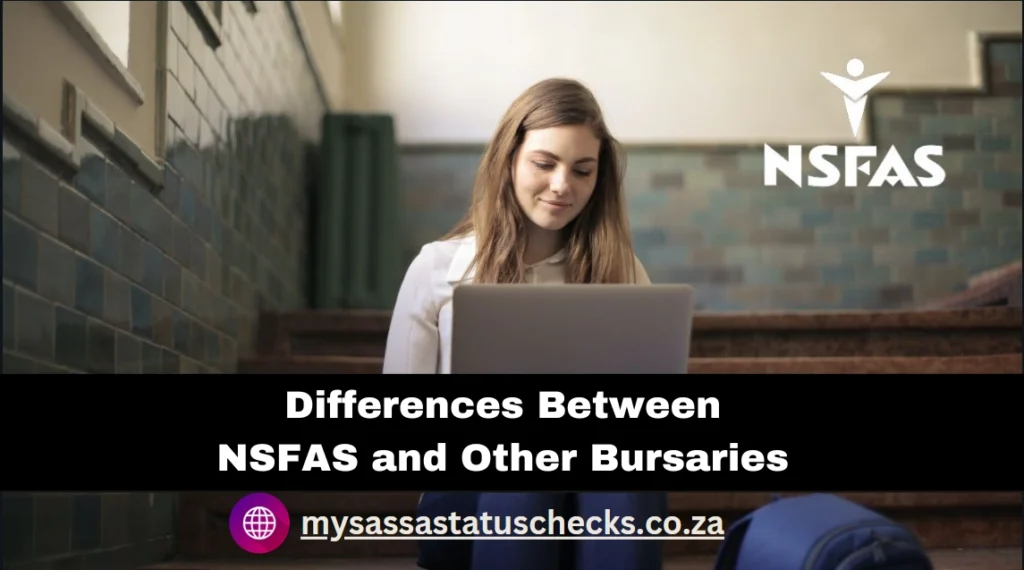Differences Between NSFAS and Other Bursaries
In South Africa, most students can’t enroll in higher education due to financial instability. NSFAS, which is a government program, takes a good step and provides financial support to those students who are from poor backgrounds or cant afford study expenses. Many people confuse NSFAS or Bursary. In this article We will guide you the differences between NSFAS and other bursaries.
NSFAS only provides financial aid in the form of loan or bursary. It helps those students who meet eligibility criteria to pursue their further studies.

Table of Contents
What is meant by NSFAS?
NSFAS is basically a government entity. It is run by the higher education department and training program.
It is basically a loan which provides students to get admission in their desired field (public university or TVET college) without taking any tension regarding finance.
Before 2017 NSFAS worked as a loan. But at the start of 2018, it also provides bursary scheme if you meet the required target
40% loan will be exempted if you perform well in your academic studies. While the rest will be repaid after the completion of graduation degree.
What is the meaning of Bursary?
Bursaries is a monetary award granted to students who get good marks in every subject of their module. It also provides due to monetary requirements or specific demographic elements but if you fail in any subject. It will be reduced comparatively.
However, Bursary might be offered by any educational government organizations, private corporations as well as non-profit companies.
It does not need to be repaid because it is a gift to extraordinary students. As they achieve good grades in their academics.
The eligibility criteria for NSFAS and other Bursaries
These are applicable only to those students who are:
- You must be South African citizen.
- Got admission in TVET college or any government university.
- With a Disability (household income is less than 6 lacs per annum).
- Family income (household income: not more than 3 lacs per year).
Understanding the differences between NSFAS and other Bursaries
It is important for the students to navigate the differences between NSFAS and other Bursaries. There are many differences but we will explaining some below:
| NSFAS | Other Bursaries | |
| 1. | Source of funding | |
| It is a government entity owned by higher education sector. | It may be provided by various sources such as: private companies, public companies or any non-profitable corporation. | |
| 2. | Repayment | |
| Only 40% will be exempted if you achieve good performance in every academic module. But the rest will be repaid when you compete the graduation and get employed. | It doesn’t have to be repaid as it a financial reward for merit students. | |
| 3. | Covering | |
| It covers institutional fees, stationary items fees, accommodation, living expenses etc. | While, on the other hand bursary covers half or full tuition fees regardless of their income, along with additional expenses like: books, transportation expenses and so on. | |
| 4. | Eligibility Criteria | |
| It is basically provided to overcome the financial needs of the students to meet their educational studies. | It is provided for those students who meet the target performance in their academies. It is also focusing on certain demographic factors while providing bursary. | |
| 5. | Application procedure | |
| The following documents will be considered while applying for NSFAS. Like proof of household income as well as other related documents. It is also focusing on academic performance, and who are committed to complete their studies. | This process requires certain submissions, such as: research proposal, essays, involved in extracurricular activities. However, few bursaries require personal appraisal or interviews. | |
We are committed to provide you all the information which can be helpful for you to understand the whole eligibility criteria, download the complete NSFAS Guide 2024.
Conclusion
In this article, we explained what is the the differences between NSFAS and other bursaries, as well as their eligibility criteria. To sum up, NSFSA provides both loan and bursary too. It depends on certain factors whether you receive bursary or loan. It includes monetary need or educational performance. By understanding the differences between NSFAS and other bursaries, students can make better decisions according to their financial requirements. They can continue their further studies without financial worries.


